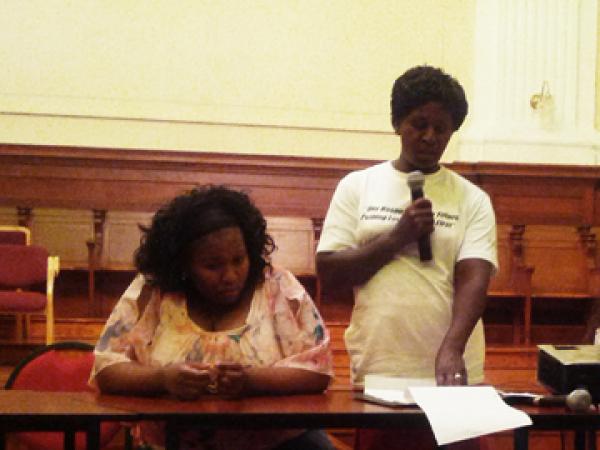Communities speak out against destructive mining practices

Edna Kusena (42) lives in the diamond-rich area of Chiadzwa in Zimbabwe, where the Marange diamond fields are spread over some 570 square kilometers. Three years ago, Edna and 4,300 families were relocated to an area on the outskirts of Chiadzwa.
The relocation was authorized by the Zimbabwean government. It made way for seven licensed companies to mine diamonds in Chiadzwa. Some of these companies include the state-owned diamond mining company, Marange Resources. Most of these companies operate as joint ventures with the Zimbabwe Mining Development Corporation.
The contamination of water by the mining companies has lead to a scarcity in water available for domestic and agricultural use. Since 2011, Edna and her family have struggled to access water in their community.
“Imagine a woman giving birth with only two buckets available for each household per day. We’re far from ambulances and other services. Dead water flows here and some of our children repeatedly get skin infections,” says Edna.
Closer to the area where the mine is located, ample water is available for mining companies to sustain their business activities. Edna and other community members regularly travel to Chiadzwa to access clean water.
But even that is a struggle, since the area is fenced. “They have made our old community a prohibited area. We now need a permit to go there,” says Edna.
Edna’s story was told on Thursday at a forum hosted by the Economic Justice Network (EJN) on destructive mining practices in mining communities. The event, held at the Centre for the Book in Cape Town, forms part of the 5th Alternative Mining Indaba.
The public forum provides an opportunity for community members living in mining areas to share their experiences on the impact mining has on the quality of their lives.

Community activists share their experiences at the public forum. Photo by Sibusiso Tshabalala.
Closer to home, Matthews Tlhabane (38), a community activist working in Witbank, says mining has created a cycle of dependency and desperation in mining communities.
Tlhabane points out that “mineworkers are not the only ones who bear the brunt of exploitative practices.”
For instance, “When mining activity slows down, the community is left with contaminated water and unworkable land.”
Tlhabane said that although mineral resources can help accelerate economic growth, the way people benefit at community level remains a challenge.
The Benchmarks Foundation, a non-profit faith based organization, monitors the performance of corporates in relation to their business activities in communities. One of it’s members, Chris Molebatsi (48), a former mineworker at the Lonmin Mine in Marikana, shared his insights on how community-led monitoring could offer possible solutions.
“I worked at the mine and my experiences have stirred me to educate myself more about these things. With the little we know as community monitors, we try to hold these mining companies accountable,” Molebatsi said.
Chris Molebatsi, a community monitor talks about his work in the Marikana area in Rustenburg.
During the public forum, several community workers and activists talked about community monitoring as an effective tool to empower mining communities. Through monitoring, communities can lobby for reform and pressurise regulating authorities to enforce the regulations on mining companies.
The Justiça Ambiental movement (“environmental justice” in Portuguese) has formed solidarity bonds between communities affected by destructive mining practices in Brazil and Mozambique.
In a presentation, Justiça Ambiental shared a video report submitted to the United Nations Special Rapporteur on Housing. The video highlights the prevalence of cracked houses in areas close to the mines. Cracked housing in mining communities is often a consequence of mining.
Commenting on the impact of mining in Cateme, Mozambique, a young activist featured in the video points out that many families living off subsistence farms have been forced to move.
Cateme, well known for its fields of cassava and orange-fleshed sweet potato, is now home to Vale, a global Brazilian mining company. Since Vale started mining operations in Cateme, over 700 families have been relocated to an undeveloped area where they cannot access basic amenities.
Support independent journalism
Donate using Payfast

Don't miss out on the latest news
We respect your privacy, and promise we won't spam you.
Next: We should write for our readers, not the owner ““ an interview with Ann Crotty
Previous: GroundUp Newsletter 07 February 2014: South Africa’s water wars and other stories

This article is licensed under a Creative Commons Attribution-NoDerivatives 4.0 International License.
